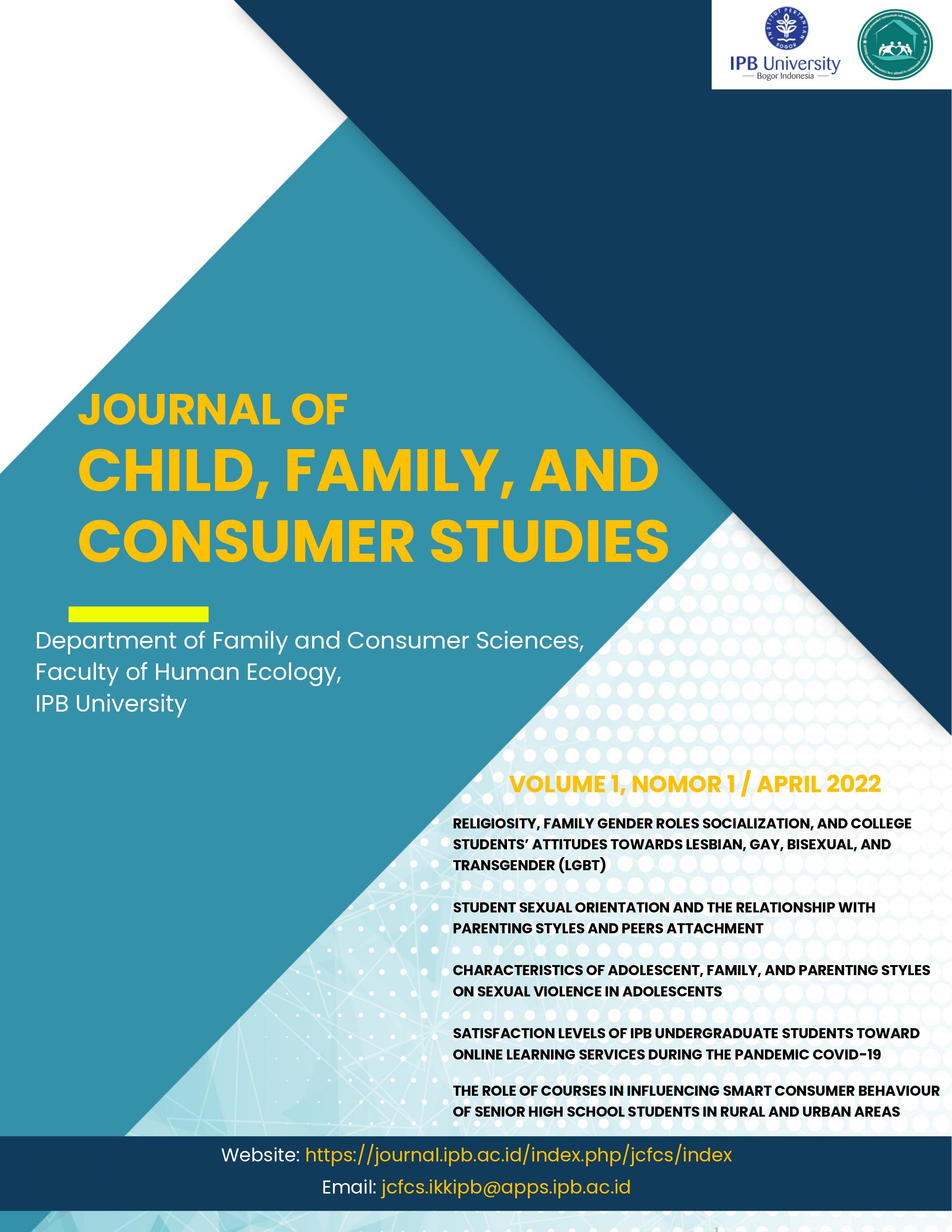SATISFACTION LEVELS OF IPB UNDERGRADUATE STUDENTS TOWARD ONLINE LEARNING SERVICES DURING THE COVID-19 PANDEMIC
Abstract
The Covid-19 pandemic has forced all educational institutions' teaching and learning processes to change the method to be online. Bogor Agricultural University (IPB) is one of the universities that has participated in implementing online learning starting from March 2020. This study aims to analyze the effect of service quality, customer satisfaction, and net benefit. This research belongs to the type of explanatory research through surveys. Respondents in this study were selected using a voluntary sampling technique with 255 respondents. Data was collected through an online questionnaire using a google form. The data obtained were processed using Microsoft Excel, SPSS version 25, and SMART-PLS 3. The results of the descriptive analysis show that, in general, students are satisfied with the service during the implementation of online learning. Half of the students fall into the category of low net benefits. The influence test results show that service quality had a significant positive effect on customer satisfaction, and customer satisfaction had a significant positive effect on net benefits. Suggestions that can be given are that IPB, lecturers, and departmental staff need to maintain and improve the quality of online learning services from various aspects.
References
Amos, P. I., & Hasan, Z. (2017). Quality of Teaching and its Influence on Student Satisfaction and Intention to Continue with Institution. International Journal of Education, Learning and Training, 2(1), 1-11. doi:10.24924/inject/2017.04/v2.isS-1/1.11.
Anggraini, R., & Purwacaraka, M. (2020). The level of satisfaction of undergraduate nursing students in the fifth semester with online lectures during the covid-19 pandemic. Journal of health research, 10(2), 90-94. http://journal.stikvinc.ac.id/index.php/jpk/article/view/215
Arma, D. P. (2020). Communication Ethics Between Students and Lecturers on Social Media (Discourse Analysis Study on WhatsApp Messages) (Doctoral dissertation, UIN RADEN INTAN LAMPUNG). http://repository.radenintan.ac.id/12764/
Bhakti, Y. B., & Rahmawati, E. Y. (2018). Student Satisfaction Index on Services for the Mathematics Education Study Program. Formative: Scientific Journal of Mathematics and Natural Sciences Education, 7(3). http://dx.doi.org/10.30998/formatif.v7i3.2238Barbera, E., Clara, M., & Linder-Vanberschot, J. A. (2013). Factors influencing student satisfaction and perceived learning in online courses. E-learning and Digital Media, 10(3), 226-235. doi:10.2304/elea.2013.10.3.226.
Bastola, P., Ameenb, A., & Isaacc, O. (2019). The Effect of E-Learning Actual Use on the Net Benefit among Public Universities Students in Nepal. In 22nd International Conference on IT Applications and Management (ITAM) (pp. 158-164). Tersedia pada https://www.researchgate.net/profile/Ali-Ameen/publication/334450650.pdf.
Berry, L. L., Parasuraman A., Zeithaml V. A. (1988). Servqual: a multiple-item scale for measuring consumer perceptions of service quality. Journal of Retail, 64(1): 12–40.
Bijami, M., Md Taib, F. B., & Md Shahbudin, A. S. (2018). Motivating Factors for the Quality of Teaching : Students’ Perception. Sci. Int. (Lahore), 30(6), 899–904. Tersedia pada: http://www.sci-int.com/pdf/636807717557917086.pdf.
Bolliger, D. U., & Wasilik, O. (2009). Factors influencing faculty satisfaction with online teaching and learning in higher education. Distance education, 30(1), 103-116. doi:https://doi.org/10.1080/01587910902845949.
Chuah, C. W., & Sri Ramalu, S. (2011). Students satisfaction towards the University: Does service quality matter?. International Journal of Education, 3(2), 1-15. doi:10.5296/ije.v3i2.1065.
Cole, M. T., Shelley, D. J., & Swartz, L. B. (2014). Online instruction, e-learning, and student satisfaction: A three-year study. The International Review of Research in Open and Distributed Learning, 15(6). doi:10.19173/irrodl.v15i6.1748.
Darmawan, F. (2015). Measurement of Satisfaction Level of E-Learning Utilization (Case Study: E-Learning IF UNPAS). Journal Speed, 7(4), 64-70. doi: http://dx.doi.org/10.3112/speed.v7i4.1378.
DeLone, W. H., & McLean, E. R. (2003). The DeLone and McLean model of information systems success: a ten-year update. Journal of management information systems, 19(4), 9-30. doi: https://doi.org/10.1080/07421222.2003.11045748.
Fieger, P. (2012). Measuring Student Satisfaction from the Student Outcomes Survey. Technical Paper. Australia: Never.
Ghozali, I. (2013). Multivariate Analysis with IBM SPSS 21 Program seventh edition. 7th Ed. Semarang: Diponegoro University Publisher.
Hakim, M., & Mulyapradana, A. (2020). The effect of media uses and learning motivation on student satisfaction during the covid-19 pandemic. Widya Cipta: Secretariat and Management Journal, 4(2), 154-160. https://doi.org/10.31294/widyacipta.v4i2.8853
Harrati, N., Bouchrika, I., Tari, A., & Ladjailia, A. (2016). Exploring user satisfaction for e-learning systems via usage-based metrics and system usability scale analysis. Computers in Human Behavior, 61, 463-471. doi:10.1016/j.chb.2016.03.051.
Hayatri, I. (2020). The role of self-regulation in learning as a mediator of teaching quality and student satisfaction with online learning [thesis]. Yogyakarta: Indonesian Islamic University. Available at https://dspace.uii.ac.id/123456789/28488.
Hoon, T. S., & Satiman, F. (2016). An Investigation on the Dimensions of Service Quality in Private Schools. Asian Journal of University Education, 12(1), 39-51. Tersedia pada https://eric.ed.gov/?id=EJ1207801.
Indonesian Child Protection Commission. (2020). There were 246 complaints at KPAI about online learning, and students complained about quota-accumulating assignments [accessed September 2, 2020]. Available at https://www.kpai.go.id/berita/ada-246-aduan-di-kpai-dunia-belajar-daring-siswa-keluhkan-tugas-menmpuk-kuota
[IPB] Bogor Agricultural University. (2021). Circular Letter Number 1876/IT3/KM.01.01/P/T/2021 concerning Policy for Implementation of KBM Even Semester FY 2020/2021 [accessed February 26, 2021]. Available at https://covid19care.ipb.ac.id/policy-ipb-covid19/.
Irawati, D. Y., & Jonathan, J. (2020). Evaluation of the Quality of Online Learning During the Covid-19 Pandemic: A Case Study at the Faculty of Engineering, Darma Cendika Catholic University. Journal of Industrial Systems Engineering, 9(2), 135-144. https://doi.org/10.26593/jrsi.v9i2.4014.135-144
Martorejo, T. N. (2020). The Covid-19 Pandemic: Threats or Challenges for the Education Sector. Bonus Journal, 7(1), 1-15. Available at https://core.ac.uk/download/pdf/328807842.pdfMinistry of Health of the Republic of Indonesia. (2020). Guidelines for preparedness against novel coronavirus infection (2019-nCov). Directorate General of Disease Prevention and Control [accessed September 2, 2020]. Available at www.kemkes.go.id.
Ministry of Education and Culture. (2020a). Circular No. 4 of 2020 concerning the Implementation of Education Policies in the Emergency Period for the Spread of Coronavirus Disease (Covid-19) [accessed December 2, 2020]. Available at https://www.kemdikbud.go.id/main/blog/2020/03/se-mendikbud-pelaksanaan-policy-education-dalam-masa-darurat-penyebaran-covid19.
Ministry of Education and Culture. (2020b). Ministry of Education and Culture Launches Three Policies to Support Students and Schools Affected by COVID-19 [accessed September 2, 2020]. Available at https://www.kemdikbud.go.id/main/blog/2020/06/kemendikbud-launch-tiga-policy-support-mahasiswa-dan-school-terdampak-covid19.
Napitupulu, R. M. (2020). The impact of the Covid-19 pandemic on distance learning satisfaction. Journal of Educational Technology Innovation, 7(1), 23-33. https://doi.org/10.21831/jitp.v7i1.32771
Nurhayati, N., & Zuhra, F. (2020). Analysis of Muslim University Mathematics FKIP Student Satisfaction Levels on the Use of E-Learning in the Era of the Covid 19 Pandemic. Al Qalasadi Scientific Journal of Mathematics Education, 4(2), 83-90. https://doi.org/10.32505/qalasadi.v4i2.2184
Noer, L. R. (2016). Analysis of improving the service quality of ITS Surabaya technology management master students using the servqual method and importance-performance analysis (IPA). Journal of Research and Technology, 2(1), 35-43. Available at https://core.ac.uk/download/pdf/228914806.pdf.
Panday, R. (2019). The influence of the quality of services and facilities of the Faculty of Economics on students' satisfaction with the Faculty of Economics at Bhayangkara University, Greater Jakarta: 1–8. doi:10.31227/osf.io/82bza.
Pham, L., Limbu, Y. B., Bui, T. K., Nguyen, H. T., & Pham, H. T. (2019). Do e-learning service quality influence e-learning student satisfaction and loyalty? Evidence from Vietnam. International Journal of Educational Technology in Higher Education, 16(1), 1-26. doi:10.1186/s41239-019-0136-3.
Puteri, S. L. E., & Arnesia, P. D. (2020). Analysis of google classroom as a distance learning system during the covid-19 pandemic using the DeLone and McLean information system success model. Proceedings of SeNTIK, 4(1), 57-64. Available at https://jak-stik.ac.id/ejournal3/index.php/sentik/article/view/280.
Prasetya, T. A., & Harjanto, C. T. (2020). The influence of the quality of online learning and the level of student satisfaction on learning outcomes during the Covid19 pandemic. Journal of Technology and Vocational Education, 17(2), 188-197. doi: http://dx.doi.org/10.23887/jptk-undiksha.v17i2.25286.
Priyastuti, M. T., & Suhadi, S. (2020). Student Satisfaction with Online Learning During the Covid-19 Pandemic Journal of Language and Health, 1(2), 49-56. https://doi.org/10.37287/jlh.v1i2.383
Rahmat, A. B. D., Seminar, K. B., & Suroso, A. I. (2019). Evaluation of the success of e-learning in the perspective of information systems (a case study of the Open University). Journal of Business and Management Applications (JABM), 5(3), 373-373. doi:10.17358/jabm.5.3.373.
Ramseook-Munhurrun, P., Lukea-Bhiwajee, S. D., & Naidoo, P. (2010). Service quality in the public service. International journal of management and marketing research, 3(1), 37-50. Tersedia pada http://ssrn.com/abstract=1668833.
Regulation of the Minister of Education and Culture Number 109 of 2013 concerning the Implementation of Distance Learning in Higher Education. (2013). [accessed February 28, 2021]. Available at https://lppmp.uns.ac.id/wp-content/uploads/2018/03/Permen-Nomor-109-tahun-2013-ttg-PJJ.pdf
Rohmantara, R., & Robecca, J. (2017). Analysis of student satisfaction with facilities for academic activities using the service quality method at the Indonesian computer university. Industrial Engineering Study Program: Indonesian Computer University, 6(1): 39-48. doi: 0.34010/IQE.V6I1.1387.
Sabara, E., & Sabran. (2019). Blended learning learning through google classroom. Proceedings of the Seminar. National LP2M UNM, :98-101. Available at: ojs.unm.ac.id/semnaslemlit/article/view/11252
Savitri, A. (2019). Demographic Bonus 2030: Responding to the Challenges and Opportunities of Education 4.0 and the 4.0 Business Revolution. Semarang: Genesis.
Seliana, N., Suroso, A. I., & Yuliati, L. N. (2020). Analysis of the successful implementation of e-Learning in the engineering faculty of the University of Riau. Journal of Business and Management Applications (JABM), 6(2), 369-369. doi:10.17358/jabm.6.2.369.
Shin, J. C., Postiglione, G. A., & Huang F. (2015). Mass Higher Education Development in East Asia. Switzerland: Springer International Publishing.
Sholihin, U. (2019). The Influence of 5 Dimensions of Service Quality on Customer Satisfaction. At-Tamil Journal: Islamic Economic Studies, 1(1), 72-97. doi: https://doi.org/10.33367/at.v1i1.742
Siming, L., Gao, J., Xu, D., & Shaf, K. (2015). Factors Leading to Students' Satisfaction in the Higher Learning Institutions. Journal of Education and Practice, 6(31), 114-118.Tersedia pada https://eric.ed.gov/?id=EJ1083362
Strong, R., Irby, T. L., Wynn, J. T., & McClure, M. M. (2012). Investigating Students' Satisfaction with eLearning Courses: The Effect of Learning Environment and Social Presence. Journal of Agricultural Education, 53(3).doi:10.5032/jae.2012.03098.
Suarman, S. (2015). Teaching quality and students satisfaction: the intermediatory role of the relationship between lecturers and students of the higher learning institutes. Mediterranean Journal of Social Sciences, 6(2), 626-632.doi:10.5901/mjss.2015.v6n2p626.
Sukmanasa, E., Novita, L., & Siti, F. (2017). Analysis of Student Satisfaction on the Performance of Lecturers of the Primary School Teacher Education Study Program at Pakuan University. Pedagogical: Scientific Journal of Education, 1(2), 91-99. https://doi.org/10.55215/pedagonal.v1i2.390
Sumarwan, U. (2003). Consumer Behavior, Theory, and Its Applications. Jakarta: Ghalia Indonesia.
Sumarwan, U. (2011). Consumer Behavior: Theory and Its Application in Marketing. Jakarta: Ghalia Indonesia.
Sumarwan, U. (2013). Marketing and Consumer Research Series: 3. 3rd Ed. Bogor: IPB Press.
Syahra, Palilati A., & Yusuf, H. (2020). The effect of information quality, system quality and service quality on student satisfaction. JUMBO (Journal of Management, Business and Organs, 4(1): 29–38. Available at http://ojs.uho.ac.id/index.php/JUMBO/article/view/12325.
Syakur, A. (2018). The Relationship between Service Quality and Student Satisfaction and Student Loyalty in the Learning Model at the Surabaya Pharmacy Academy. Reformation, 8(2), 100-108. https://doi.org/10.33366/rfr.v8i2.1091
Taman, A., Sukirno, S., Sari, A. R., Setiawan, N., & Pustikaningsih, A. (2013). Analysis of Service Quality on Student Satisfaction at the Faculty of Economics, Yogyakarta State University. Nominal: Barometer of Accounting and Management Research, 2(1), 99-111. https://doi.org/10.21831/nominal.v2i1.1651
Wahyudin, D. (2021). Analysis of student satisfaction majoring in da'wah management at Uin Sayyid Ali Rahmatullah Tulungagung towards online lectures. Ta'allum: Journal of Islamic Education, 9(2), 417-430. https://doi.org/10.21274/taalum.2021.9.2.417-430
Yaumi, M. (2018). Media and Learning Technology. Jakarta: Prenada Media.










